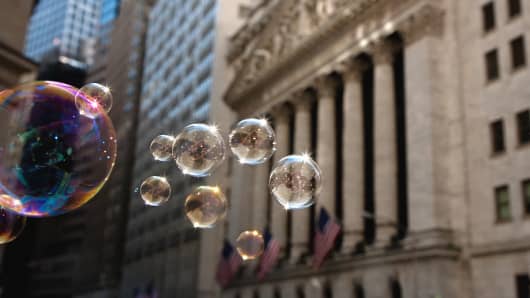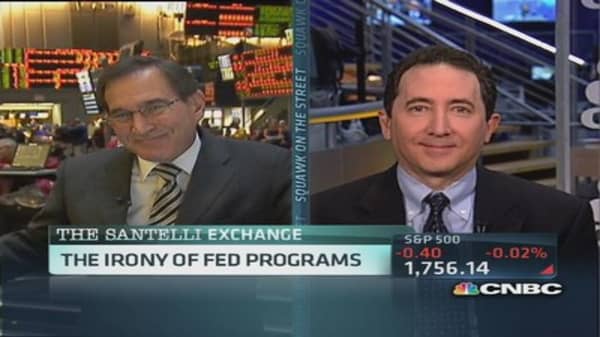Using earnings before interest, taxes, depreciation and amortization as a yardstick, large buyouts this year have been happening on a 6.15 times debt-to-EBITDA level, while midsize deals have averaged 5.28 times. That compares to 5.9 times and 5.1 times respectively to 2012 figures, and is just below the 7.05 times and 5.53 times in 2007.
(Read more: For the Fed, 'bubble' talk may top 'taper' talk)
Interpreting such data can be difficult and its beauty or lack thereof often is in the eye of the beholder.
On one hand, the main tipping point for the financial crisis was a freezing of credit markets. So getting them going again is a positive at least in general terms.
Determining that point, though, when froth is forming and debt is getting bubbly is much more difficult.
(Read more: It's back with a vengeance: Private debt)
"Striking the right balance is hard," Josh Feinman, chief global economist at Deutsche Bank, said in an interview. "We don't want to be where we were in '08 and '09 when financial markets were shut down, but we don't want to get to a point where we're over our skis. It's really hard to calibrate. It's something that the Fed is watching very closely."
(Read more: Property hot spots renew easy-money bubble fears)
Indeed, the Federal Reserve has made a point at several junctures in recent months to worry about market distortions, though it has taken no action yet to curb financial excesses.
Fed Governor Jeremy Stein has given a series of speeches this year that focused on the central bank's power and need to offset financial bubbles.
However, Stein has continued to vote with the majority in continuing the low interest rate environment that has helped pave the way for heavy leverage in the marketplace.
(Read more: By not tapering, Fed actually increased stimulus)
"They're cognizant that one of the ways monetary policy in general and specifically (quantitative easing) and forward guidance works is through financial channels, by bringing down term premia and risk premia and encouraging people to take risk," Feinman said. "But they're also worried that kind of thing could get out of hand."
There are a number of other areas in which the use of leverage has flourished, in addition to the record $401 billion of margin debt used to buy stocks.
Loans used for company acquisitions are at $259 billion in 2013, the highest total since 2008's $275 billion and the fourth highest ever, according to Dealogic.
Dollar-denominated bonds issued by foreign banks and corporations in the U.S.—often referred to in the financial markets as "Yankee debt"—are at an all-time high of $730 billion.
While the anticipation is that yields likely will begin to rise next year and debt won't be so cheap anymore, the climate for leverage could still be strong.
(Read more:Fed might not be as confused as Doug Kass thinks)
"Contrary to popular belief, LBO activity can remain strong during periods of rising rates, if rates are rising for good reasons," Bank of America Merrill Lynch said in a report for clients. "To this end, private equity firms place more weight on growth than on the rising cost of debt."
Figuring out when that climate gets overdone, then, could get even more attention from the Fed in 2014 as a potential debt bubble builds.
"Their policy effect is through financial channels," said Deutsche Bank's Feinman. "They don't want to shut that off, but at the same time they don't want it to get overdone."
—By CNBC's Jeff Cox. Follow him on Twitter @JeffCoxCNBCcom.





